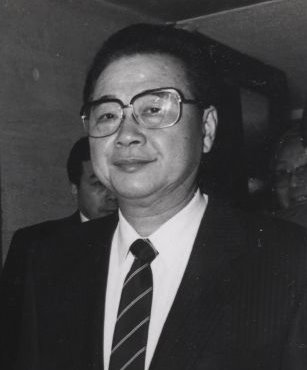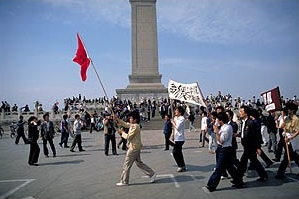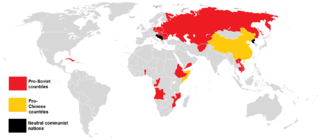Related Research Articles

Deng Xiaoping was a Chinese revolutionary and statesman who served as the paramount leader of the People's Republic of China (PRC) from December 1978 to November 1989. After Chinese Communist Party chairman Mao Zedong's death in 1976, Deng gradually rose to supreme power and led China through a series of far-reaching market-economy reforms earning him the reputation as the "Architect of Modern China".

Li Peng was a Chinese politician who served as the fourth Premier of the People's Republic of China from 1987 to 1998, and as the Chairman of the Standing Committee of the National People's Congress, China's top legislative body, from 1998 to 2003. For much of the 1990s Li was ranked second in the Chinese Communist Party (CCP) hierarchy behind then Party General Secretary Jiang Zemin. He retained his seat on the CCP Politburo Standing Committee until his retirement in 2002.

The Tiananmen Square protests, known in China as the June Fourth Incident were student-led demonstrations held in Tiananmen Square, Beijing, China, lasting from 15 April to 4 June 1989. After weeks of unsuccessful attempts between the demonstrators and the Chinese government to find a peaceful resolution, the Chinese government declared martial law on the night of 3 June and deployed troops to occupy the square in what is referred to as the Tiananmen Square massacre. The events are sometimes called the '89 Democracy Movement, the Tiananmen Square Incident, or the Tiananmen uprising.

Hu Yaobang was a Chinese politician who was a high-ranking official of the People's Republic of China. He held the top office of the Chinese Communist Party (CCP) from 1981 to 1987, first as Chairman from 1981 to 1982, then as General Secretary from 1982 to 1987. Hu joined the CCP in the 1930s, and rose to prominence as a comrade of Deng Xiaoping. During the Cultural Revolution (1966–1976), Hu was purged, recalled, and purged again by Mao Zedong. His tomb is in Gongqingcheng, a county-level city under the jurisdiction of Jiujiang.

Zhao Ziyang was a Chinese politician. He was the third premier of the People's Republic of China from 1980 to 1987, vice chairman of the Chinese Communist Party (CCP) from 1981 to 1982, and CCP general secretary from 1987 to 1989. He was in charge of the political reforms in China from 1986, but lost power in connection with the reformative neoauthoritarianism current and his support of the 1989 Tiananmen Square protests.

Li Xiannian was a Chinese Communist military and political leader, president of the People's Republic of China from 1983 to 1988 under paramount leader Deng Xiaoping and then chairman of the Chinese People's Political Consultative Conference from 1988 until his death. He was a full member of the Politburo from 1956 to 1987, and of its Standing Committee from 1977 to 1987.

The time period in China from the death of Mao Zedong in 1976 until the Tianamen Square protests in 1989 is often known as Dengist China. In September 1976, after Chairman Mao Zedong's death, the People's Republic of China was left with no central authority figure, either symbolically or administratively. The Gang of Four was purged, but new Chairman Hua Guofeng insisted on continuing Maoist policies. After a bloodless power struggle, Deng Xiaoping came to the helm to reform the Chinese economy and government institutions in their entirety. Deng, however, was conservative with regard to wide-ranging political reform, and along with the combination of unforeseen problems that resulted from the economic reform policies, the country underwent another political crisis, culminating in the crackdown of massive pro-democracy protests in Tiananmen Square.

In the People's Republic of China, Deng Xiaoping formally retired after the 1989 Tiananmen Square protests and massacre, to be succeeded by former Shanghai CCP secretary Jiang Zemin. During that period, also known as Jiangist China, the crackdown of the protests in 1989 led to great woes in China's reputation globally, and sanctions resulted. The situation, however, would eventually stabilize. Deng's idea of checks and balances in the political system also saw its demise with Jiang consolidating power in the party, state and military. The 1990s saw healthy economic development, but the closing of state-owned enterprises and increasing levels of corruption and unemployment, along with environmental challenges continued to plague China, as the country saw the rise to consumerism, crime, and new-age spiritual-religious movements such as Falun Gong. The 1990s also saw the peaceful handover of Hong Kong and Macau to Chinese control under the formula of One Country, Two Systems. China also saw a new surge of nationalism when facing crises abroad.

Bao Tong was a Chinese writer and activist. He was Director of the Office of Political Reform of the Central Committee of the Chinese Communist Party (CCP) and the Policy Secretary of Zhao Ziyang. He was also Director of the Drafting Committee for the CCP 13th Party Congresses, known for its strong support of market reform and opening up under Deng Xiaoping. Prior to this, he was a committee member and then deputy director of the Chinese State Commission for Economic Reform. During the 1989 Tian’anmen square protests, he was one of the very few Chinese senior officials to express understandings with the demonstrating students, which led to his arrest shortly before the June Fourth incident.
The history of the People's Republic of China details the history of mainland China since 1 October 1949, when CCP chairman Mao Zedong proclaimed the People's Republic of China (PRC) from atop Tiananmen, after a near complete victory (1949) by the Chinese Communist Party (CCP) in the Chinese Civil War. The PRC is the most recent political entity to govern mainland China, preceded by the Republic of China and thousands of years of monarchical dynasties. The paramount leaders have been Mao Zedong (1949-1976); Hua Guofeng (1976-1978); Deng Xiaoping (1978-1989); Jiang Zemin (1989-2002); Hu Jintao (2002-2012); and Xi Jinping.

Sino-Soviet relations, or China–Soviet Union relations, refers to the diplomatic relationship between China and the various forms of Soviet Power which emerged from the Russian Revolution of 1917 to 1991, when the Soviet Union ceased to exist.
Chen Xitong was a member of the Politburo of the Chinese Communist Party and the Mayor of Beijing until he was removed from office on charges of corruption in 1995.

Yao Yilin was a Vice Premier of the People's Republic of China from 1979 to 1988, and the country's First Vice Premier from 1988 to 1993.
The Beijing Workers' Autonomous Federation (BWAF), or Beijing Workers’ Autonomous Union was the primary Chinese workers' organization calling for political change during the Tiananmen Square protests of 1989. The group was formed in the wake of mourning activities for former General Secretary of the Chinese Communist Party Hu Yaobang in April 1989. The BWAF denounced political corruption, presenting itself as an independent union capable of "supervising the Communist Party," unlike the Party-controlled All-China Federation of Trade Unions (ACFTU).
The April 26 Editorial was a front-page article published in People's Daily on April 26, 1989, during the Tiananmen Square protests. The editorial effectively defined the student movement as a destabilizing anti-party revolt that should be resolutely opposed at all levels of society. As the first authoritative document from the top leadership on the growing movement, it was widely interpreted as having communicated the party's zero-tolerance position to student protesters and their sympathizers.

On June 9, 1989, China's Military Chairman Deng Xiaoping delivered what was officially termed his "Speech Made While Receiving Cadres of the Martial Law Units in the Capitolat and Above the Army Level". It was his only public speech on the 1989 Tiananmen Square protests and massacre, following the army's intervention and use of force on the student-led protests on June 4. Portions of the speech aired on the CCTV program Xinwen Lianbo on that same evening. The speech was delivered to a group of People's Liberation Army generals in Beijing. It set the defiant tone for the Chinese leadership that the army's use of force was fully justified, demonstrated that Deng was still firmly in charge of China, quelled rumours of impending civil war, and signaled that China's economic reforms would continue as planned.

The socialist fraternal kiss was a special form of greeting between socialist state leaders. The act demonstrated the special connection that exists between Communist countries, consisting of an embrace, along with a series of three kisses on alternate cheeks. In rare cases, when the two leaders considered themselves exceptionally close, the kisses were given on the mouth rather than on the cheeks.
The first of two student hunger strikes during the 1989 Tiananmen Square protests and massacre began on May 13, 1989, in Beijing. The students said that they were willing to risk their lives to gain the government's attention. They believed that because plans were in place for the grand welcoming of Mikhail Gorbachev, the General Secretary of the Communist Party of the Soviet Union, on May 15, at Tiananmen Square, the government would respond. Although the students gained a dialogue session with the government on May 14, no rewards materialized. The Chinese Communist Party (CCP) did not heed the students' demands and moved the welcome ceremony to the airport.

Relations between the People's Republic of China and the Soviet Union underwent significant change from 1969 to 1991, from open conflict to bitter détente to diplomatic partners by 1989. Relations between the Soviet Union (USSR) and Chinese Communist Party (CCP) dated back to the founding of the CCP in Shanghai in 1921, a meeting conducted under the supervision of the Communist International. The Soviets remained cautious partners with the rising CCP throughout the 22 years of the Chinese Civil War, and the USSR was the first nation to recognize the People's Republic of China in 1949. The following year saw the signing of the Sino-Soviet Treaty and founding of the Sino-Soviet alliance as well as the beginning of a decade of economic cooperation between the two nations.
References
- 1 2 3 Garver, John (December 1989). "The "New Type" of Sino-Soviet Relations". Asian Survey. 29 (12): 1136–1152. doi:10.2307/2644761. JSTOR 2644761.
- 1 2 3 Vamos, Peter (2010). China Learns From the Soviet Union. Lexington Books. p. 95. ISBN 978-0-7391-4224-0.
- 1 2 3 4 Vamos, Peter (2010). China Learns From the Soviet Union. Lexington Books. p. 96. ISBN 978-0-7391-4224-0.
- 1 2 3 "USSR-China: The Deng-Gorbachev Summit" (PDF). National Intelligence Daily. United States Director of National Intelligence. 10 May 1989. Archived from the original (PDF) on January 24, 2017.
- ↑ Vamos, Peter (2010). China Learns From the Soviet Union. Lexington Books. p. 99. ISBN 978-0-7391-4224-0.
- 1 2 Tuabman, William (2017). Gorbachev: His Life and Times. New York: W.W. Norton & Company, Inc. p. 479. ISBN 978-0-393-64701-3.
- 1 2 3 4 5 Vamos, Peter (2010). China Learns from the Soviet Union. Lexington Books. p. 100. ISBN 978-0-7391-4224-0.
- 1 2 3 4 5 6 "USSR-China: Glow of Gorbachev Visit Dimmed by Chinese Turmoil". DNSA collection: China and U.S. Intelligence, 1945-2010 United States. Foreign Broadcast Information Service. May 24, 1989. ProQuest 1679049961.
- ↑ Liu, Xiaoyuan; Mastny, Vojtech; Wenger, Andreas (2004). China and Eastern Europe, 1960s – 1980s : proceedings of the International Symposium: Reviewing the History of Chinese-East European Relations from the 1960s to the 1980s, Beijing, 24-26 March 2004. Zürich: Forschungsstelle für Sicherheitspolitik und Konfliktanalyse der ETH Zürich. p. 203. ISBN 978-3-905641-98-1. OCLC 237887634.
- 1 2 "National Intelligence Daily China: Protests Become a Mass Movement; USSR-China: Gorbachev Visits Shanghai". DNSA collection: China and U.S. Intelligence, 1945-2010. United States Director of Central Intelligence. May 18, 1989. ProQuest 1679050955.